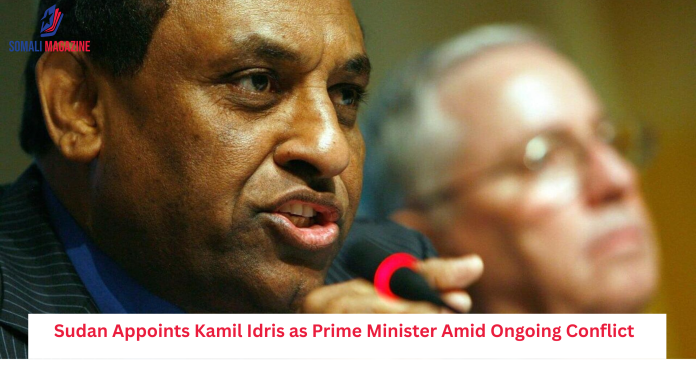Facebook Twitter (X) Instagram Somali Magazine - People's Magazine
First Prime Minister Named Since 2021 Coup as Army Seeks Stability During War with RSF
Sudan’s army chief, General Abdel Fattah al-Burhan, has appointed Kamil Idris as the new prime minister of Sudan’s military-led government. This marks the first time a prime minister has been appointed since the army-led coup in 2021 removed the country’s civilian leadership and installed a caretaker government.
Kamil Idris is a former United Nations official and was previously a presidential candidate. His appointment comes at a time when Sudan is facing a brutal war between the national army and the paramilitary Rapid Support Forces (RSF), making it unclear how much real authority the new prime minister will have in the current conflict.
Just weeks before Idris was named prime minister, Burhan had appointed Dafallah al-Haj Ali, a diplomat, as acting prime minister. However, that appointment never seemed to take effect or lead to any major developments.
Alongside naming a new prime minister, Burhan also made changes to Sudan’s ruling sovereign council. He reappointed Salma Abdel Jabbar Almubarak and brought in a new member, Nowara Abo Mohamed Mohamed Tahir. These appointments appear to be part of efforts to restructure the government in the midst of ongoing unrest.
There had been expectations that a new civilian-led government would be formed once the army regained full control of the capital city, Khartoum. In March 2025, the army made significant progress in reclaiming Khartoum from the RSF, raising hopes for political changes. However, the country remains far from stability.
The conflict between Sudan’s army and the RSF began in April 2023. It erupted after disagreements between the two groups over how to merge their forces under a single national military. Before turning against each other, the army and the RSF had worked together to seize power in a 2021 coup that interrupted Sudan’s democratic transition. That transition had started after the 2019 overthrow of longtime ruler Omar al-Bashir.
The fighting between the army and the RSF has devastated Sudan, causing large-scale destruction, displacement of civilians, and a worsening humanitarian crisis. Despite recent gains by the army in Khartoum, the RSF continues to launch powerful attacks, including drone strikes targeting Port Sudan, which has become a wartime capital for the military leadership.
The appointment of Kamil Idris signals an attempt by the army to restore some form of governance and possibly open a path toward rebuilding the country. However, without an end to the war and the RSF’s resistance, it remains uncertain how effective Idris can be as prime minister.
Sudan’s future remains unclear, with both military and political developments unfolding rapidly. For now, the country continues to face deep instability, and the hopes for a peaceful, civilian-led government are still uncertain.

